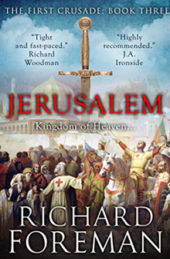Simon Turney, what prompted you to choose the period that you wrote your first book in?
The majority of my books are set within the Roman empire. Rome has been my love and my focus since I first visited Hadrian’s Wall at the age of 6. I first wrote Roman fiction in an attempt to make Julius Caesar’s own writings more accessible to a modern reader, but Rome is such fascinating and fertile ground for a writer, that I find new stories to tell every time I open the pages of a text.
What is your approach to researching your novels? Has the process changed over the years?
I base my novels on fascinating characters, obscure but unusual events or interesting places. I like to visit all the locations I will write about before I begin, and I then attempt to place the characters and events I’ve researched in ancient texts into the context of the places I have walked and breathed.
Historical fiction is a great introduction to history. Can you recommend any historians to our readers to learn more about your period?
Specifically referencing Rome, a few texts I would highly recommend would be Carcopino’s Daily Life in Ancient Rome for social history, any work by Mike (M.C.) Bishop and John Coulson, or by John and Hilary Travis for the military, and Dans la Rome des Césars by Gilles Chaillet for the ancient city itself.
What three pieces of advice would you give to a budding historical novelist, looking to write and publish their first book?
Choose a subject and period that you know and which interests you, but also one which is on the rise among readers for saleability. Do not be discouraged by rejections, because every first book will suffer a slew of them, even if it’s brilliant. Persevere. Grow a thick skin. And finally, when the books is done, get it edited by a professional. Edit, polish, edit and polish again and then, when you think it’s ready to send, edit and polish it a few more times. Then hold your breath and press send.
If you could choose to meet any historical figure from your period, who would it be and why?
I would meet Gaius Julius Agricola, the general acknowledged to have conquered Britain. I would love to know the truth of his time here and to know what really happened and where the battle of Mons Graupius took place, if it ever did. Agricola is the architect of Roman Britain, according to his son-in-law Tacitus. Was he really?
Similarly, if you could witness one event from history, what would it be and why?
I would go back to republican Rome to see the very first amphitheatre of Rome made by Curio. Pliny tells us “He caused to be erected, close together, two theatres of very large dimensions, and built of wood, each of them nicely poised, and turning on a pivot. Before mid-day, a spectacle of games was exhibited in each; the theatres being turned back to back, in order that the noise of neither of them might interfere with what was going on in the other. Then, in the latter part of the day, all on a sudden, the two theatres were swung round, and, the corners uniting, brought face to face; the outer frames, too, were removed, and thus an amphitheatre was formed, in which combats of gladiators were presented to the view” Who would not want to see that?
Which other historical novelists do you admire?
Primarily, that would be Christian Cameron. Of all the historical novelists I know I have yet to find anyone to match the man. His research is impeccable and often personally reenacted, which means that the reader knows everything he reads is as close to reality as a modern writer can manage, which, combined with his ability to create vivid characters and locations and to spin a yarn like a skald of old, makes him simply the best historical novelist alive today.
When first sketching out an idea for a novel, which comes first – the protagonist, plot or history?
None of the above. Or maybe all. It all depends on what grabs my attention. For Praetorian, the entire series was driven by the impressive career portrayed on the tombstone of the man I used as a protagonist. The Ottoman Cycle began because I read of an obscure historical event in 1480s Istanbul in which a church exploded. My new Wolves of Odin series began because of a piece of graffiti in the Hagia Sophia, and thirty-some runestones in Sweden, telling the story of an ill-fated expedition.
Do you have a daily routine as a writer? Also, how important is it to know other writers and have a support network?
- Get the kids to school and then coffee, until it pours out my ears.
- Write until lunchtime, ideally covering 5,000 words.
- Spend the afternoon relaxing and editing.
- During the evening, research and planning.
- Often at 1 or 2 am I will feverishly pour a whisky and add new scenes
When I first started in this game, I assumed that HistFic authors would be competitive and fighting for readership. I was soon disabused of that notion. In fact it is far more of a fraternity, and the level of help and support between authors within the genre continues to amaze and impress me. I would not be where I am now without the support of the writers, readers and other industry professionals who have been there at every step, and I am always there to similarly lend a hand when they need it.
Can you tell us about the project you are working on at the moment?
I am putting the last touches to the latest Praetorian book, which tells the story of the civil war between Septimius Severus and Pescennius Niger, while exploring the frumentarii Roman secret service and the world of Roman Judea. Thrills, spills and treacherous b***ards. And I am part-way through planning my next book, the second Wolves of Odin book which involves the world of Byzantium in the reign of the fascinating empress Zoe.
Simon Turney is the bestselling author of the Praetorian and Rise of Emperors series.





